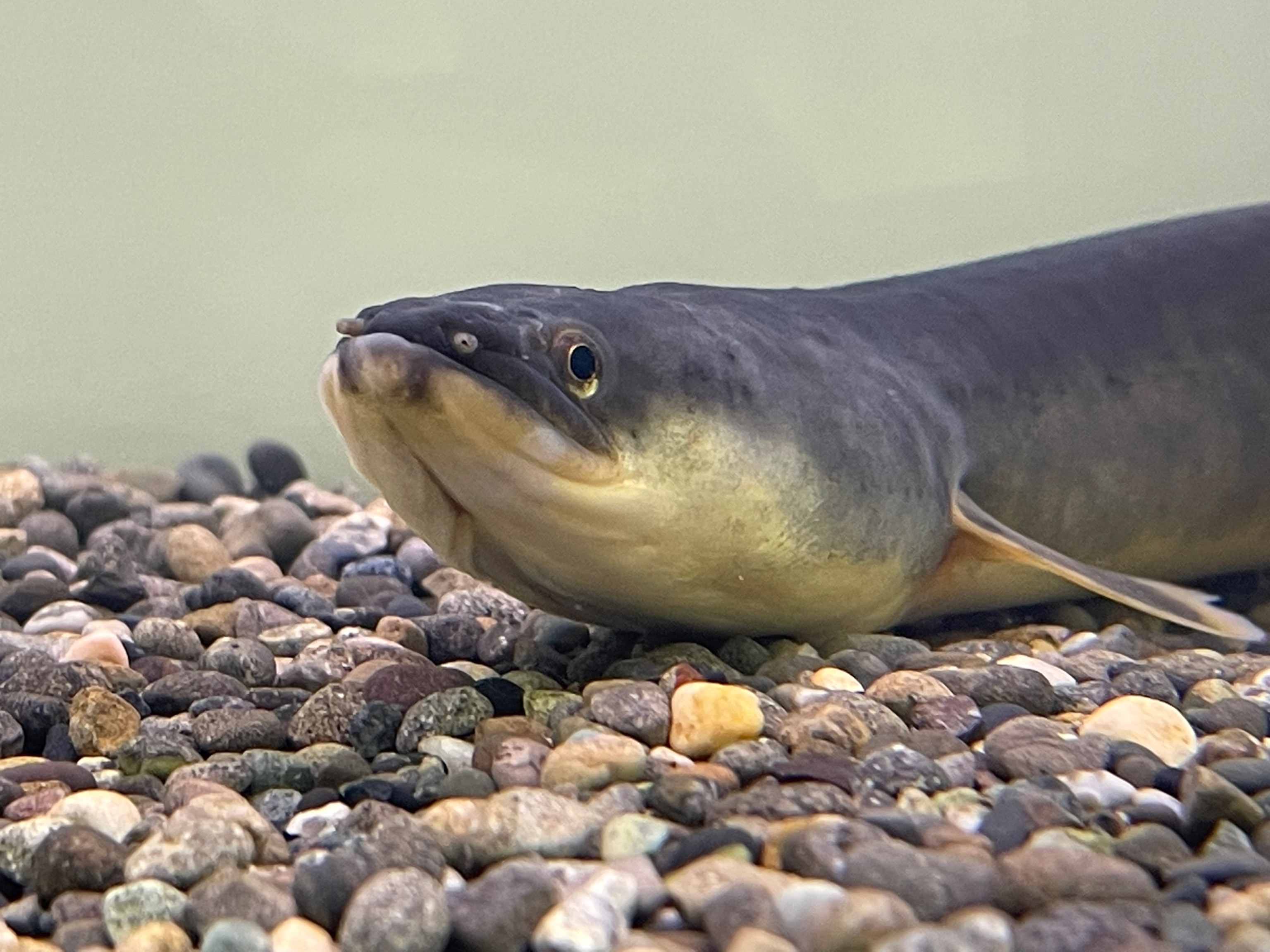Is climate change putting the lobster roll in jeopardy?
The deep waters in the Gulf of Maine have cooled down after decades of rapid warming, but it’s hard to say yet if that’s good news

Since the early 1980s, Maine lobstermen have experienced a climate-driven lobster boom.
That’s because climate change has been warming the Gulf of Maine more than three times faster than 99 percent of the ocean. Warmer waters initially meant more lobster, but by 2050 conditions may become challenging for lobsters to survive in.
“They can stand quite a heat, but I don't think they particularly like it,” Lennie Young, an eighth-generation lobsterman from Corea, Maine says. “It's just a waterborne bug, but it keeps you guessing. It doesn't always do what you expect it to do.”

Lobsters molt as they grow, shedding their old shell and growing a new, softer one. They’re an ectothermic species, which means their body processes are dictated by the surrounding water temperature: the warmer the water, the more likely the lobsters are to molt earlier.
Newly-molted lobsters, often referred to as shedders, drive the peak season, when most of the lobster is caught and sold. Thanks to warmer waters, lobsters have typically been showing up in traps in low numbers in April and come in earnest by the first of July, allowing lobstermen (a title applied to all genders) to extend their high-earning months. This year, waters are cooler than average, and peak lobster season is yet to come. Young says he thinks the season will probably start the third or fourth week of July instead.
Young has been measuring surface temperature on his own for decades, and the temperature on the surface hasn’t changed much compared to previous years. He says it’s likely colder temperatures farther below that are causing the lobsters to molt (and move into traps) later this year, a theory confirmed by Katherine Mills, a senior scientist at the Gulf of Maine Research Institute (GMRI).
(Learn more about how climate change is impacting the Gulf of Maine.)
It’s a rare cool year exhibiting deep-water temperatures that haven’t been seen in the last fifteen years, an anomaly in a rapidly-warming gulf and another hurdle in an increasingly unpredictable industry.
“I think what this year highlights is just a real need to think about uncertainty,” Mills says.

Cooler temperatures—for now
The temperatures in the Gulf of Maine are controlled by the interplay between cold water moving south through the Labrador Current and warm water moving north through the Gulf Stream. The last six months of colder and fresher deep waters have resulted from waters with a little more Labrador than Gulf Stream, perplexing scientists. Since a 2012 marine heatwave, the deep-water temperatures have been about 3°F warmer than average, but this year, temperatures are back to levels not seen since before 2011.
But it’s still hard to say if this year’s cooler waters will benefit Maine’s lobsters, particularly if the warming trend continues in future years. Colder water means more fat on larval lobster’s preferred prey, zooplankton, which is good for baby lobster growth and nutrition.
Warmer water, on the other hand, could lead to less nutritional zooplankton, and sustained, high temperatures weakens lobsters’ respiratory and immune systems.
(Climate change isn't just threatening lobsters. Here's how high temperatures imperil peaches and tomatoes.)
Forecasting exact temperature changes in the gulf if challenging. While the region is rapid warming, natural fluctuations in global ocean currents shift every few decades and could still introduce cooler temperatures, mitigating some of the effects of climate change.

Unpredictable seasons and storms
Right now, the colder, deep water makes it a harder year for lobstermen. A later start means less time to earn a year’s worth of income, Virginia Olsen explains.
Olsen is a fifth-generation lobsterman from Stonington and an advocate for fair regulations for lobstermen. The shorter fishing season and the effects of unpredictable water and weather are just some of the many challenges lobstermen are facing.
“There's so much pressure put on the fishermen right now, it's very difficult for them,” she says.
“Who wants to go out and put down a quarter of a million dollars on the beginning of a new boat, to not know what's going to happen in the end? That uncertainty is a lot of mental pressure for these guys.”
Environmental conditions outside of the water have also become more unpredictable. Storms in the region have become more destructive and dump more precipitation. Those storms wreaked havoc on small towns across coastal Maine earlier this year, causing millions of dollars of damage to wharves, boats, and piers. That, too, has made this year more challenging as lobstermen have to invest in repairs before the peak season even begins.
Changing ocean chemistry
Climate change is also lowering the ocean’s pH, an effect known as ocean acidification. While the results of that haven’t hit the markets yet, it’s a looming threat that has significantly impacted other fisheries like oyster farmers in the Pacific Northwest.
(Learn more about how climate change affects oysters.)
Acidic waters make it harder for lobsters and the zooplankton they eat to form their shells. Populations could be impacted as soon as 2050. Altered pH may also affect the lobsters’ ability to smell, diminishing their ability to sense food, avoid predators, and find mates.
Facing these challenges and an uncertain long-term future, some lobstermen are adapting and diversifying their income streams.
Young has colleagues who run tourist boats now, and Olsen knows lobstermen who have taken up oyster and seaweed farming to supplement their income. However, they remained concerned that the uncertainty will push small businesses out of the industry and the way of life will be lost or overtaken by bigger, more industrialized boats.
But lobstermen may yet be able to adapt to an unpredictable new norm and are working with researchers on solutions. The GMRI recently released a Climate Adaptation Resource Hub, and lobstermen have practiced conservation methods on their own for centuries. If anyone is invested in securing the livelihood, it’s lobstermen.
“What they want, what their soul needs, is the water,” Olsen says. “I can't express or put into words, the feeling that I get when I'm on the water.”
You May Also Like
Go Further
Animals
- What would the world look like without mosquitoes?What would the world look like without mosquitoes?
- Social media loves to villainize dolphins. Here's why it's wrong.Social media loves to villainize dolphins. Here's why it's wrong.
- How did wolves evolve into dogs? New fossils provide cluesHow did wolves evolve into dogs? New fossils provide clues
- This unorthodox method is saving baby parrots from extinctionThis unorthodox method is saving baby parrots from extinction
- A deadly disease that affects cats big and small found in U.S.A deadly disease that affects cats big and small found in U.S.
Environment
- ‘Corn sweat’—and other weird weather phenomena—explained‘Corn sweat’—and other weird weather phenomena—explained
- A sea tornado sank a yacht. We might see them more often.A sea tornado sank a yacht. We might see them more often.
- How billions of dollars are revolutionizing ocean explorationHow billions of dollars are revolutionizing ocean exploration
- Where to go stargazing in Chile according to a local astronomer
- Paid Content
Where to go stargazing in Chile according to a local astronomer
History & Culture
- Did Babe Ruth really ‘call’ this legendary home run?Did Babe Ruth really ‘call’ this legendary home run?
- The real history behind the legend of China's Monkey KingThe real history behind the legend of China's Monkey King
- How new technology transformed the American workforceHow new technology transformed the American workforce
- This secret Civil War sabotage mission was doomed from the startThis secret Civil War sabotage mission was doomed from the start
- This rare burial site reveals secrets about the Sahara's lush pastThis rare burial site reveals secrets about the Sahara's lush past
Science
- Why some say tennis is 'the world's healthiest sport'Why some say tennis is 'the world's healthiest sport'
- Your body ages rapidly at 44 and 60. Here's how to prepare.Your body ages rapidly at 44 and 60. Here's how to prepare.
- How do gold nuggets form? Earthquakes may be the keyHow do gold nuggets form? Earthquakes may be the key
- Astronauts getting stuck in space is more common than you thinkAstronauts getting stuck in space is more common than you think
Travel
- These are the must-see sights of Italy's Veneto regionThese are the must-see sights of Italy's Veneto region
- A guide to St John's, Atlantic Canada's iceberg capitalA guide to St John's, Atlantic Canada's iceberg capital







